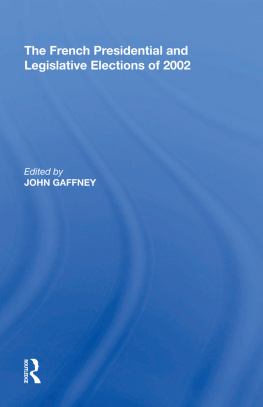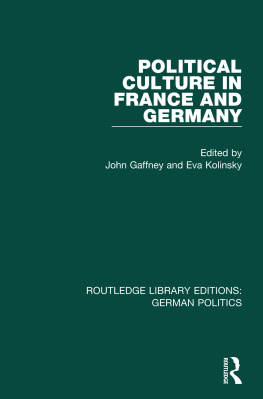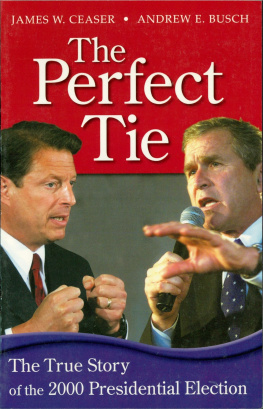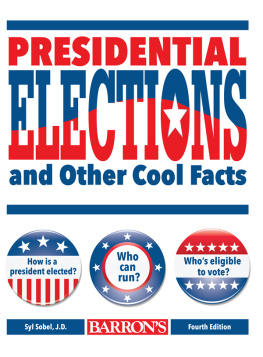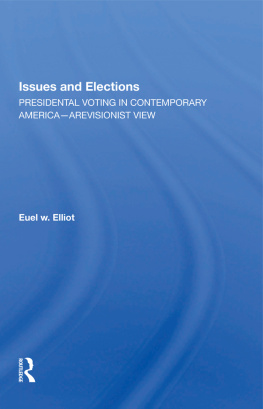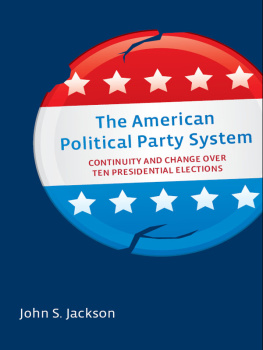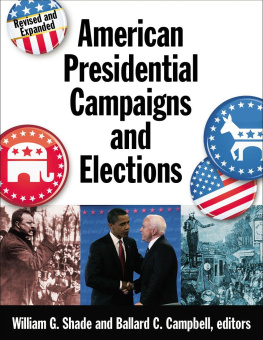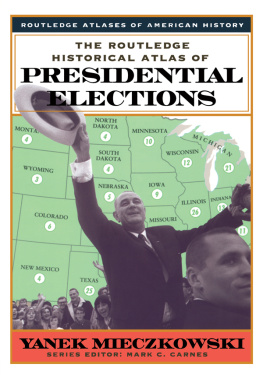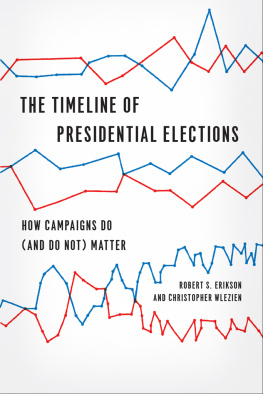First published 2004 by Ashgate Publishing
Reissued 2018 by Routledge
2 Park Square, Milton Park, Abingdon, Oxon OX14 4RN
711 Third Avenue, New York, NY 10017, USA
Routledge is an imprint of the Taylor & Francis Group, an informa business
John Gaffney, 2004
John Gaffney has asserted his right under the Copyright, Designs and Patents Act, 1988, to be identified as the editor of this work.
All rights reserved. No part of this book may be reprinted or reproduced or utilised in any form or by any electronic, mechanical, or other means, now known or hereafter invented, including photocopying and recording, or in any information storage or retrieval system, without permission in writing from the publishers.
A Library of Congress record exists under LC control number: 2004041043
Notice:
Product or corporate names may be trademarks or registered trademarks, and are used only for identification and explanation without intent to infringe.
Publisher's Note
The publisher has gone to great lengths to ensure the quality of this reprint but points out that some imperfections in the original copies may be apparent.
Disclaimer
The publisher has made every effort to trace copyright holders and welcomes correspondence from those they have been unable to contact.
ISBN 13: 978-0-815-39775-5 (hbk)
ISBN 13: 978-1-351-14672-2 (ebk)
Chapter 1
The 2002 Elections in Institutional and Comparative Perspective
John Gaffney
Aston University
If there has been one constant factor, one certainty, in French politics since the beginning of the Fifth Republic in 1958, it is that the unpredictable will happen, almost without fail.
From de Gaulle's political triumph in May-June 1958, to the military coup against him in 1961 and its outcome; from his unexpected approach to Algeria, to his own surprise at having to go to a run-off with Franois Mitterrand in the 1965 presidential elections; from the explosion of 1968 to the - temporary - defeat of Gaullism in 1974 at the hands of a Gaullist conspirator, Jacques Chirac; from 1970s neo-Gaullism to the triumph of the left in 1981; from the PS' defeat in 1986 to Mitterrand's triumphant re-election to the presidency two years later; from Chirac's near-eclipse in 1988 to his victory in 1995;from the left's successful government, 1997-2002 to its humiliating defeat/s of 2002 - if there is one thing that is certain in French politics, it is that nothing is.
On 21 April 2002 in France, the world's most passionate democracy, one of its oldest ones too, and one of the world's richest and largest economies, and politically, socially, and culturally, one of if not the most sophisticated civilisations on the planet; on 21 April the rest of the world's startled attention turned suddenly and dramatically to France, the country that would have itself an exemplary republic, as it elected to the 'run off round for the presidency - the heroic Charles de Gaulle's old job - Jean-Marie Le Pen, a political leader of the hard right, a man believed by many to be a fascist, a racist, and a political thug. We say suddenly and dramatically because until 21 April no one outside France was really paying any attention at all. In fact, this was, if it is possible, equally true of the attention being paid inside France. It is difficult in the post-2002 period to recapitulate quite how dull the run up to the 2002 election was, how foregone was the assumed 21 April conclusion, how uninterested the French were in its outcome: Jacques Chirac and Lionel Jospin through to the equally dull second round, which of them would win was itself uncertain, although it did not really seem to matter which of the two would eventually win on 5 May. Of course, the dullness, the foregone conclusions, the perceived interchangeability of the main candidates, in terms of policy if not in terms of personality, are themselves of great significance, both in terms of what they tell us about the nature of contemporary French politics, but also, of course, formatively: in terms of their influence upon the outcome of the first round, the latter's own dramatic influence upon the second round, the ensuing legislative elections and the effects upon the political parties and political developments generally over the longer term. In fact, there were 'winners' to these events, but there were many more losers; the effects upon, for example, the political left, have been of historic import - because Le Pen beat Jospin by 0.68 per cent of the votes. Such chance, however, is what French politics is built upon, almost made out of.
Whatever the true causes and character of Le Pen's candidacy and importance in contemporary French politics; some interpretations were held by many as self-evident: he reflected a hardening, crueller France, he was fascist and the French sympathised, he was and they did not but they were fed up, he was not really a fascist, but they sometimes almost are, he is not and they are not either, he was an 'accident', or a product of a serendipitous or dysfunctional system, simply the beneficiary of a left ia plus bte du monde'Republic may be thrown into a period of rapid change, even crisis, given its unresolved institutional ambiguities, but when we cannot be sure. Against this, we can say that elements of unpredictability do seem, paradoxically, constant, certainly in electoral terms, even if we put their longer term or deeper consequences to one side for a moment. Many elections are correctly predicted, and their outcomes unsurprising (e.g. the legislatives of2002 themselves). But if we take simply the presidential elections; de Gaulle was not expected to have to go through to a run-off in 1965, the non-communist left was not expected to be quite so humiliated (5 per cent) by the 1969 presidential election, nor the communists so successful (21.5 per cent). The 1974 election was a knife-edge victory (354,000 votes); the 1981 election was assumed to be Giscard's victory until only months before the ballot. 1988 saw Mitterrand treated like a new de Gaulle, although only two years before he was seen as doomed and humiliated. In 1995, Chirac was seen as a political has-been less than six months before the election (and Jospin too not only that but was relatively unheard of outside the political and professional classes). And then, of course, there is Le Pen in 2002.
Even, however, if we allow for this predictable unpredictability - although one would have thought by now that observers would have begun to anticipate such upset apple carts - we can still question the validity of the 'earthquake' as metaphor, in as much as the unpredictability at another level of seismic activity may or should have been more predictable than was the case. The answers to this lie of course in the analysis of Le Pen's vote, but also in that of all the other candidates, those of Jospin and his (many) rivals on the left, in Mgret's rather hopeless showing against Le Pen, in Chirac's extraordinarily weak first round vote (the weakest of any winner in the Fifth Republic), in fact in the overall topography or 'archaeology' of all of the vote, and of course all of the non-vote, this election being characterised by its very high, by French standards, abstention rate (28.4 per cent), a factor which probably determined the outcomes more than anything else. The relationship of these phenomena to their shifting pre-first round social context, their relation to the institutional context of France (cohabitation, direct election to the presidency, the role of the prime minister and relationship of government to the presidency), and finally the cultural relation of the presidency to French leadership in general, and to the tradition of the hard right in France (and arguably its own cultural relation or affinities with the Gaullist republic); all these factors point us to an understanding of France at the beginning of the new millennium which takes us beyond the political naivety of the earthquake metaphor, at least as regards its unforeseeable nature, even though not perhaps as regards its thunderous effects.


